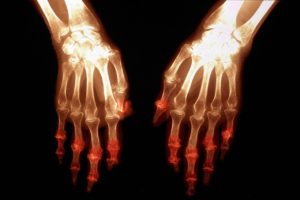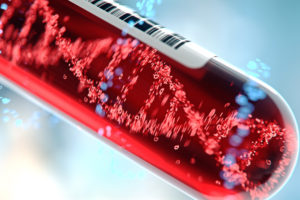Rheumatoid Arthritis Bioscpecimens
Bay Biosciences provides high-quality, frozen sera (serum), K2-EDTA plasma and matched peripheral blood mononuclear cells (PBMC’s), bio-fluids from rheumatoid arthritis (RA) patients for research.
The PBMCs, sera (serum) and plasma bio-fluid specimens are processed from rheumatoid arthritis (RA) patients peripheral whole-blood using customized collection and processing protocols.

Rheumatoid Arthritis (RA) Overview
Rheumatoid arthritis is an autoimmune condition that can cause pain, swelling, and stiffness in the joints. Though there is no cure, early diagnosis and treatment can help manage symptoms and prevent permanent joint damage.
RA is an autoimmune disease that can cause joint pain, inflammation, and damage throughout the body.
The joint damage that RA causes usually happens on both sides of the body. So, if a joint is affected in one of your arms or legs, the same joint in the other arm or leg will probably be affected, too. This is one way that doctors distinguish RA from other forms of arthritis forms of arthritis, such as osteoarthritis (OA).
Treatments work best when RA is diagnosed early, so it’s important to learn the signs. Read on to learn everything you want to know about RA, from types and symptoms to home remedies, diets, and other treatments.
Types of Rheumatoid Arthritis (RA)
There are several different types of RA. Knowing which type you have may help your healthcare professional choose the best type of treatment for you.
The types of RA include:
- Seropositive RA: This is the most common type of RA. This type of arthritis may run in families. Seropositive RA may come with more severe symptoms than seronegative RA.
- Seronegative RA: This means you’ve tested negative for both rheumatoid factor (RF)and a type of antibody called cyclic citrullinated peptides (CCP), but you’re still experiencing RA symptoms.
- Juvenile idiopathic arthritis (JIA): As the name suggests, this is a form of RA in children. The prevalence varies depending on the research and has been found to be as high as 3.8 to 400 cases per 100,000 children.
Symptoms of Rheumatoid Arthritis (RA)
RA is a chronic disease marked by inflammation and pain in the joints. These symptoms and signs increase during periods known as flares or exacerbations. Other times are known as periods of remission, which is when symptoms can disappear completely.
The disease symptoms commonly affect joints in the hands, wrists, and knees but can also affect tissues and organs throughout the body, including the lungs, heart, and eyes.
Symptoms can include stiffness, tenderness, swelling, and pain in more than one joint, among other non-joint-related symptoms.
These symptoms can vary from mild to severe. It’s important not to ignore your symptoms, even if they come and go. Knowing the early signs of RA will help you and your healthcare professional better treat and manage it.

Causes of Rheumatoid Arthritis (RA)
Rheumatoid arthritis is an autoimmune disorder where the immune system attacks healthy body tissues, causing inflammation and damage to the joints and sometimes to other body systems.
RA has some known triggers. If left untreated, the joint can become damaged, lose its shape and alignment, and ultimately be destroyed.
Risk Factors
A number of genetic and environmental factors may increase your chance of developing rheumatoid arthritis.
Though it can affect anyone at any age, the chance of developing rheumatoid arthritis increases with older age. Females assigned at birth (FAABs) are likelier to develop it than males assigned at birth (MAABs). Researchers believe that reproductive and hormonal factors may contribute to the development of this disease in females
Other risk factors include genetics, smoking, obesity, and diet.
Diagnosis of Rheumatoid Arthritis (RA)
Diagnosing RA can take time and may require multiple lab tests to confirm clinical examination findings. Your healthcare professional will use several tools to diagnose RA.
First, they’ll ask about your symptoms and medical history. They’ll also perform a physical exam of your joints, in which they will look for symptoms like swelling or issues with reflexes or joint function. If they suspect RA, they’ll most likely refer you to a specialist called a rheumatologist.
Since no single test can confirm a diagnosis of RA, your healthcare professional or rheumatologist may use several different types of tests.
These include blood draws testing for antibodies or other substances elevated during inflammatory conditions. They may also send you for certain imaging tests, such as an ultrasound, X-ray, or MRI, ti see if joint damage has occurred and how severe it might be.
Treatment of Rheumatoid Arthritis (RA)
There’s no cure for RA, but medications can help manage the symptoms by controlling the inflammatory response. Decreasing the inflammation can also help to prevent further joint and organ damage.
Treat to Target, a treatment philosophy that rheumatologists use to effectively manage RA, has resulted in fewer symptoms and higher remission rates for those with RA. It involves:
- Setting a specific testing goal that signals either remission or low disease state
- Testing acute phase reactants and performing monthly monitoring to assess the progress of treatment and management plan
- Switching medication regimen promptly if progress isn’t made
Alternate Treatments
In addition, certain alternative treatments, home remedies, and lifestyle adjustments may help improve one’s quality of life when living with RA. These include specific types of exercise, rest, and assistive devices.
Particularly, your doctor or dietitian may recommend an anti-inflammatory diet to help with your symptoms. This type of diet includes foods that have lots of omega-3 fatty acids. Avoiding trigger foods and choosing the right foods will help you manage your RA.
For many people, these treatments help them live an active life and reduce the risk of long-term complications. Your healthcare professional will work with you to determine the best treatment plan for your medical needs.
Complications of Rheumatoid Arthritis (RA)
Having RA can put you at an increased chance of developing other health complications. Some people may also develop complications from medications used to treat RA.
- Anemia
- Amyloidosis
- Bone density loss (Osteoporosis)
- Carpal tunnel syndrome
- Destruction of the joints
- Eyes conditions like scleritis
- Heart disease
- Kidney failure
- Lung disease
- Lymphomas
- Other autoimmune conditions such as Sjögren’s syndrome
- Pneumonia
- Vasculitis

Bay Biosciences is a global leader in providing researchers with high quality, clinical grade, fully characterized human tissue samples, bio-specimens, and human bio-fluid collections.
Samples available include cancer (tumor) tissue, cancer serum, cancer plasma, cancer, peripheral blood mononuclear cells (PBMC). and human tissue samples from most other therapeutic areas and diseases.
Bay Biosciences maintains and manages its own biorepository, the human tissue bank (biobank) consisting of thousands of diseased samples (specimens) and from normal healthy donors available in all formats and types.
Our biobank procures and stores fully consented, deidentified and institutional review boards (IRB) approved human tissue samples and matched controls.
All our human tissue collections, human specimens and human bio-fluids are provided with detailed, samples associated patient’s clinical data.
This critical patient’s clinical data includes information relating to their past and current disease, treatment history, lifestyle choices, biomarkers, and genetic information.
Patient’s data is extremely valuable for researchers and is used to help identify new effective treatments (drug discovery & development) in oncology, and other therapeutic areas and diseases.
Bay Biosciences banks wide variety of human tissue samples and biological samples, including cryogenically preserved at – 80°C.
Including fresh frozen tissue samples, tumor tissue samples, formalin-fixed paraffin-embedded (FFPE), tissue slides, with matching human bio-fluids, whole blood and blood-derived products such as serum, plasma and PBMC.
Bay Biosciences is a global leader in collecting and providing human tissue samples according to the specified requirements and customized, tailor-made collection protocols.
Please contact us anytime to discuss your special research projects and customized human tissue sample requirements.
Types of Biospecimens
Bay Biosciences provides human tissue samples (human specimens) from diseased and normal healthy donors which includes:
- Peripheral whole-blood
- Amniotic fluid
- Bronchoalveolar lavage fluid (BAL)
- Sputum
- Pleural effusion
- Cerebrospinal fluid (CSF)
- Serum (sera)
- Plasma
- Peripheral blood mononuclear cells (PBMC)
- Saliva
- Buffy coat
- Urine
- Stool samples
- Aqueous humor
- Vitreous humor
- Kidney stones (renal calculi)
- Other bodily fluids from most diseases including cancer.
We can also procure most human bio-specimens, special collections and requests for human samples that are difficult to find. All our human tissue samples are procured through IRB-approved clinical protocols and procedures.
In addition to the standard processing protocols, Bay Biosciences can also provide human plasma, serum, and PBMC bio-fluid samples using custom processing protocols; you buy donor-specific collections in higher volumes and specified sample aliquots from us.
Bay Biosciences also provides human samples from normal healthy donors; volunteers, for controls and clinical research, contact us Now.
- 日本のお客様は、ベイバイオサイエンスジャパンBay Biosciences Japanまたはhttp://baybiosciences-jp.com/contact/までご連絡ください。


